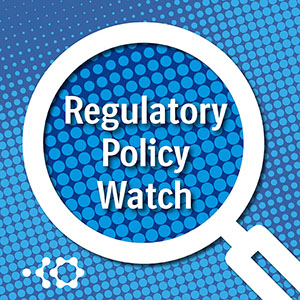Regulatory Policy Watch: Proposed Reforms to the Accelerated Approval Pathway
By Jackie Orabone, PhD and Angela Corona, PhD

The accelerated approval (AA) pathway was introduced in 1992 (in response to the AIDS epidemic) to shorten the FDA approval process for drugs to treat serious or life-threatening diseases or rare diseases where there is a high unmet medical need. AA allows for drugs to be approved on the basis of surrogate endpoints that are “reasonably likely to predict clinical benefit.”1 Part 1 of this blog series provided an introduction to the accelerated approval pathway, and Part 2 explained how surrogate endpoints for accelerated approval are identified and validated. In Part 3 of this series, we explored what happens when confirmatory trials are not completed or fail to confirm clinical benefit.
Here in Part 4 of this series, we will review recently proposed reforms to the AA pathway. Each proposed reform has slightly different provisions, but all strive to modify and update policies and procedures, better define surrogate endpoints, and implement mechanisms to ensure that confirmatory trials are completed in a timely manner.
Why are calls for reform of the AA increasing?
Most criticism of the AA pathway stems from the perception that there are insufficient guardrails, a lack of transparency in decision making, and/or a lack of sufficient incentives for sponsors to complete confirmatory trials once a drug has been granted AA. For example, there is currently no defined requirement for FDA or sponsors to withdraw an AA indication when confirmatory trials fail to confirm clinical benefit, nor is there a defined time limit for AAs. In addition, there are no strict rules defining surrogate endpoints. Therefore, calls for reform of the AA pathway have grown louder, and investigations and legislation that seek to amend the current AA process are now making their way through Congress.
US Department of Health and Human Services (HHS) Review
In August of 2021, the US HHS Office of the Inspector General announced its intent to conduct a Review of the FDA’s AA Pathway.2 This was spurred by the controversial approval of Aduhelm (aducanumab) based on an unvalidated surrogate endpoint despite the FDA advisory committee’s nearly unanimous vote against approval. HHS will review how the FDA makes decisions about when AA is appropriate. In particular, they will scrutinize how regulators apply AA in cases where a surrogate endpoint is not accepted by the scientific community to be “reasonably likely to predict clinical benefit”—as is often the case in neurology indications. Completion of the report is expected in 2023; however, legislators are not waiting for the results of this report to propose reforms.
Accelerated Approval Integrity Act of 2022 (HR 6963)
The Accelerated Approval Integrity Act of 2022,3 proposed on March 7, 2022, takes aim at a highly criticized issue with the AA pathway—the fact that there is no mechanism in place to ensure that confirmatory trials are completed in a timely manner.4 The bill proposes several reforms to the AA pathway intended to expedite the completion of confirmatory trials, and importantly, the speedy withdrawal of AAs that fail to demonstrate clinical benefit. Key proposed revisions are listed below:4
- Codifying requirements for manufacturers to conduct post-approval studies. Provisions include
- Allowing the FDA to require that studies be underway at the time of AA,
- Requiring an agreement on how the studies will be conducted before FDA can grant AA, and
- Requiring more frequent updates on the status of post-approval studies.
- Outlining expedited procedures for the FDA to withdraw approval, which would include due notice and an opportunity for a written appeal to FDA, which may result in the FDA consulting an advisory committee more frequently on these topics.
- Requiring that AA status be reflected in the product label.
- Proposing, most controversially, a 5-year deadline for completing confirmatory trials, and automatic expiration dates for AA status 1 year after post-approval studies are scheduled to be complete. Automatic expiration of AA would eliminate any flexibility on the part of FDA to consider the unmet medical need when making decisions about withdrawal of AA, which has advocates of AA and the medical community concerned.
- Including, importantly, provisions to make certain actions by the sponsor, such as failure to submit reports, prohibited and subject to penalties and fines.
Accelerating Access for Patients Act of 2022 (HR 6996)
The Accelerating Access for Patients Act of 20225 is the competing bill to the AA Integrity Act. It is similar in that it requires the FDA to establish requirements for confirmatory studies following AA and expedited procedures to withdraw AA if post-marketing requirements are not met or confirmatory studies are not conducted with due diligence. A key difference, however, is that this bill does not include a provision for automatic expiration of AA status or penalties for sponsors (a measure that is perceived to be more favorable to industry).6 In addition, 2 provisions seek to “modernize” the definition of surrogate endpoints and the design of confirmatory clinical trials:5
- The bill clarifies the type of evidence that can be used to justify a surrogate endpoint and appears to be directed towards identifying surrogate endpoints suitable for supporting AA in neurodegenerative and rare diseases, where AA has previously been controversial.
- The bill requires that the FDA issue guidance on the “use of novel clinical trial designs that may be used to conduct appropriate post-approval studies,” which may allude to the potential use of real-world evidence in confirmatory trials.
The Promising Pathway Act (S 1644)
Some legislators have opted to propose an entirely new regulatory framework for AA, rather than incrementally reforming the existing pathway.7 The Promising Pathway Act,8 reintroduced to the Senate in May 2021, would allow for time-limited, “provisional” approvals on the basis of substantial evidence of safety, along with relevant early evidence of efficacy—such as data that could be provided by a phase 1/2 study. Under the act, a provisional approval would be limited to a 2-year period and would include strict requirements for patients receiving provisionally approved drugs to join a patient registry. The act relies heavily on real-world evidence (RWE), which would be collected from patient registry data and submitted in regular reports to the agency. Importantly, the act would require the FDA to accept real-world data and surrogate endpoints as evidence to demonstrate efficacy and convert a provisional approval to a full approval.
Needless to say, regulators have raised some concerns regarding this proposal. The reliance on RWE has been identified as particularly problematic, given that studies have cast doubt on the feasibility of replicating high-quality clinical trial data using RWE.10 It’s unclear if the required patient registries under the act would be sufficient to make rigorous RWE studies feasible. However, this proposal has received vocal support from patient advocacy groups, especially in the ALS community,9 where surrogate endpoints have not been identified and few to no treatment options are available.
Accelerated approval reforms tacked onto “must pass” FDA user fee (PDUFA) renewal legislation
We now know that some of these proposed reforms are likely to become law, albeit in slightly watered-down form, as part of the PDUFA reauthorization bill. In draft legislation released on May 4, 2022, provisions were included to speed the withdrawal process for AAs and strengthen requirements for speedy confirmatory trials. Other provisions grant FDA the authority to require that confirmatory studies be underway at the time of AA and that product labels note AA status along with details on the surrogate endpoint used and any uncertainties about anticipated clinical benefit. Missing from the legislation was the controversial 5-year deadline for confirmatory trials proposed in HR 6963.
With bipartisan support, the PDUFA reauthorization bill is expected to pass and be ready for President Biden’s signature before August. Sponsors should prepare for increased scrutiny and tightened regulations around accelerated approvals.
 Jackie Orabone, PhD
Jackie Orabone, PhD
Scientific Director, Scientific Services
Jackie combines her scientific expertise in immunology and research knowledge with more than 2 years of medical communications agency experience to help clients define their strategy and develop their core content in preparation for FDA Advisory Committee meetings and other scientific communications. She has experience in a variety of therapeutic areas such as oncology, dermatology, and HIV, and in products such as vaccines and targeted biologics. Jackie earned her PhD in Pathology from Case Western Reserve University, Cleveland, Ohio, where she went on to complete a post-doctoral fellowship in genomics and bioinformatic techniques. Connect with Jackie on LinkedIn.
 Angela W. Corona, PhD
Angela W. Corona, PhD
Scientific Director, ProEd Regulatory
Angela is a Scientific Director for ProEd Regulatory. She is responsible for helping sponsors navigate complex regulatory communications, such as FDA advisory committee meetings. She develops clinical and regulatory strategy along with high-quality scientific and medical content across a wide range of therapeutic and drug development areas. Angela received her PhD in Neuroscience from The Ohio State University and completed her postdoctoral training at Case Western Reserve University.
References:
- US Food and Drug Administration. Expedited programs for serious conditions – drugs and biologics. May 2014. Updated June 25, 2020. https://www.fda.gov/regulatory-information/search-fda-guidance-documents/expedited-programs-serious-conditions-drugs-and-biologics
- US Department of Health and Human Services, Office of Inspector General. Review of the FDA’s Accelerated Approval Pathway. August 2021. https://oig.hhs.gov/reports-and-publications/workplan/summary/wp-summary-0000608.asp
- Congress.gov. H.R.6963 – 117th Congress (2021-2022): Accelerated Approval Integrity Act of 2022. March 7, 2022. https://www.congress.gov/bill/117th-congress/house-bill/6963
- House Committee on Energy & Commerce. Pallone Introduces Bill to Improve FDA’s Accelerated Approval Program [press release]. March 7, 2022. https://energycommerce.house.gov/newsroom/press-releases/pallone-introduces-bill-to-improve-fda-s-accelerated-approval-program
- Congress.gov. H.R.6996 – 117th Congress (2021-2022): Accelerating Access for Patients Act of 2022. March 8, 2022. https://www.congress.gov/bill/117th-congress/house-bill/6996/text#:~:text=Introduced%20in%20House%20(03%2F08%2F2022)&text=To%20amend%20the%20Federal%20Food,condition%2C%20and%20for%20other%20purposes
- Cafero B and Reuter T. Competing bills propose amendments to FDA’s accelerated approval program. Health Industry Washington Watch. March 18, 2022. https://www.healthindustrywashingtonwatch.com/2022/03/articles/legislative-developments/competing-bills-propose-amendments-to-fdas-accelerated-approval-program/
- Pitts PJ. Creating a promising pathway for faster access to new drugs — and a Califf confirmation. STAT. February 14, 2022. https://www.statnews.com/2022/02/14/creating-promising-pathway-to-new-drugs-califf-confirmation/
- Congress.gov. S.1644 – 117th Congress (2021-2022): Promising Pathway Act. May 13, 2021. https://www.congress.gov/bill/117th-congress/senate-bill/1644.
- I Am ALS. Senator Mike Braun reintroduces Promising Pathway Act (PPA) & The Accelerated Drug Approval for Prescription Therapies (ADAPT) Act. May 14, 2021. https://iamals.org/updates/senator-mike-braun-reintroduces-promising-pathway-act-ppa-the-accelerated-drug-approval-for-prescription-therapies-adapt-act/
- Wallach JD, Zhang AD, Skydel JJ, et al. Feasibility of using real-world data to emulate postapproval confirmatory clinical trials of therapeutic agents granted US Food and Drug Administration accelerated approval. JAMA Netw Open. 2021;4(11):e2133667. doi: 10.1001/jamanetworkopen.2021.33667.
